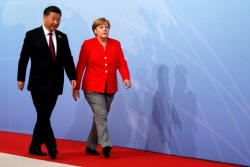With eye on China, EU parliament pushes tougher line on
investments
 Send a link to a friend
Send a link to a friend
[May 23, 2018]
By Noah Barkin and Philip Blenkinsop
BERLIN/BRUSSELS (Reuters) - Members of the
European Parliament are nearing agreement on a proposal that would
broaden the powers of the European Commission to scrutinize foreign
investments amid rising concern about Chinese acquisitions on the
continent.
The international trade committee of the parliament has been debating
roughly 450 amendments to a legislative proposal presented by the
Commission last year and is close to finalizing its own draft, with a
committee vote expected on Monday, according to several officials
involved in the discussions.
The officials said the parliament's proposal would be stronger than that
of the Commission's in several respects: it would extend the list of
sectors that could draw EU scrutiny and oblige the EU executive to vet
suspect investments, rather than just giving it the option to do so.
The draft gives a far wider definition of critical infrastructure and
technologies that could trigger the screening process. Among the sectors
added to the list include the media, ports, the automotive sector and
election infrastructure.
New language underlines the importance of safeguarding the personal data
of EU citizens. The draft also puts more emphasis on investments that
might be carried out under state influence - a nod to fears that Chinese
firms are buying up European rivals as part of an industrial strategy
orchestrated by Beijing.
"It will be stronger than the Commission proposal. There are more
sectors. A lot has been added," said one EU official involved in the
discussions.
Once the draft has been approved by the trade committee, the plan is to
move swiftly into a "trilogue" negotiation with the Commission and the
European Council, avoiding a full vote in the parliament's plenary,
according to several officials. For the legislation to proceed, the
three institutions would need to reach a consensus.
"We want to move swiftly and we don't want to endanger the balance of
the compromise," a second EU official said.
Franck Proust, a French MEP who is leading the parliament's investment
screening deliberations, signaled that a compromise was near but
declined to comment on the substance.
COUNCIL OPPOSITION
It seems doubtful that the stronger version -- which goes so far as to
list farmland, sports facilities and betting services as strategic areas
-- will be acceptable to the European Council, which groups the bloc's
28 member states.
[to top of second column] |

Chinese President Xi
Jinping walks next to German Chancellor Angela Merkel to attend the
G20 leaders summit in Hamburg, Germany July 7, 2017.
REUTERS/Wolfgang Rattay/File Photo
Bulgaria, which holds the rotating EU presidency, is pressing for a compromise
in the Council that could pave the way for a final deal by the end of the year.
But officials described three groups of states that are opposed to robust
investment screening legislation: free traders like the UK, Sweden, Denmark and
the Netherlands; small countries like Luxembourg that are wary of a Commission
power grab; and states that have benefitted from Chinese investments, including
Portugal, Malta, Hungary and possibly Greece.
"Portuguese officials have indicated that they are so fearful of losing Chinese
investments that they simply can't afford to back this," one of the EU officials
said.
Earlier this month, China's state-owned utility China Three Gorges launched a
bid for EDP-Energias de Portugal, the country's largest company. Although the
offer has raised eyebrows in other capitals, the Portuguese government has
welcomed it.
The original Commission proposal, presented last September, was prompted by a
request from Germany, France and Italy.
Berlin was spooked by the takeover of robotics firm Kuka by China's Midea in
2016 and the purchase earlier this year of a 9.7 percent stake in Daimler by
Chinese carmaker Geely.
A study released by the Bertelsmann Foundation on Tuesday, ahead of a trip by
German Chancellor Angela Merkel to China, showed that 64 percent of Chinese
investments in Germany over the past three years were in sectors Beijing is
prioritizing as part of its "Made in China 2025" strategy.
The Commission proposal states that the EU executive "may screen" foreign direct
investments that are likely to affect projects or programs of Union interest on
the grounds of security or public order. The parliament's version hardens the
language to "shall screen".
While the proposed legislation would give the Commission the right to issue
opinions and collect investment information from member states, it would leave
the final say on whether to block foreign investments to national authorities.
(Additional reporting by Phil Blenkinsop; Writing by Noah Barkin; Editing by
Raissa Kasolowsky)
[© 2018 Thomson Reuters. All rights
reserved.] Copyright 2018 Reuters. All rights reserved. This material may not be published,
broadcast, rewritten or redistributed.
Thompson Reuters is solely responsible for this content. |